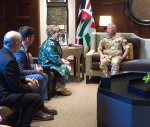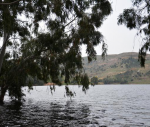You are here
Who to blame for IS
Nov 01,2014 - Last updated at Nov 01,2014
Theories abound, from experts and amateurs alike, on why the seemingly sudden surge in religious radicalism and extremism, especially after the advances of the Islamic State in Iraq and Syria.
Political scientists, psychologists, sociologists, religious authorities and statesmen of various persuasions have hastened to offer one explanation or another for the IS successes in the Middle East and the group’s ability to recruit operatives in several Western countries, including those that have declared war on the movement.
The jury is still out on why and how IS managed to achieve such “spectacular” successes at a time its methods are unorthodox and cruel beyond imagination.
Just like Al Qaeda’s rise was linked, timewise, to the war in Afghanistan and the Western decision to aid and abet the radical Islamic mujahedeen faction to wage a war against the-then Soviet Union, the time frame of the rise of IS in the region and beyond can be linked to the war in Syria.
In other words, IS, like Al Qaeda, did not just come out of the blue, but is the creation of armed conflicts at a particular point in time, and a reaction to them.
Only unlike Al Qaeda’s involvement in Afghanistan, which succeeded in driving out the mighty Soviet Union from that country in 1989, the war in Syria had much more television coverage and “benefits” from social media provided by the Internet.
Scenes of killing and destruction in Syria, on a scale unparallelled in contemporary times, are watched by millions of people all around the world and reach the homes of millions of Muslims.
The images of mass killings, aerial bombardment, barrel bombs and deployment of chemical weapons revolted millions of people and must have made many vulnerable to exploitation.
When scenes of hundred of thousands of innocent Syrians left to fend for themselves for more than three years were seen, some people became “radicalised”, inflamed, easy prey to IS. Injustice and cruelty in Syria thus become the favourable medium for radicalism, IS’ forerunner.
The international community has itself to blame for IS. Now it harvests the bitter fruit of the dire neglect of the Syrian conflict for so long.












